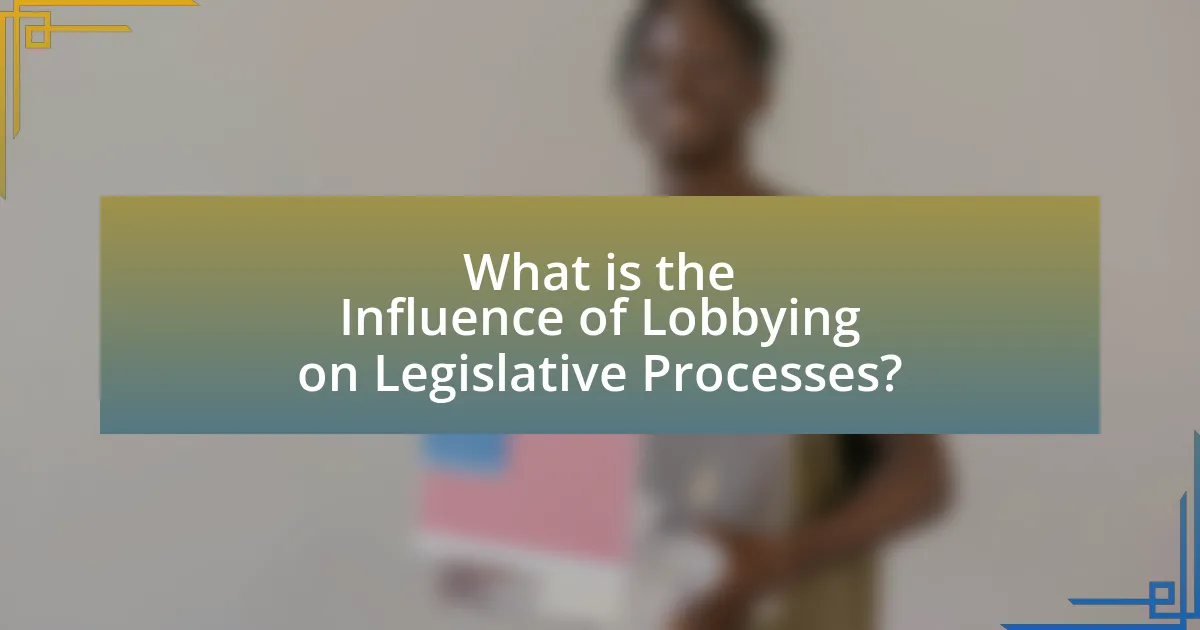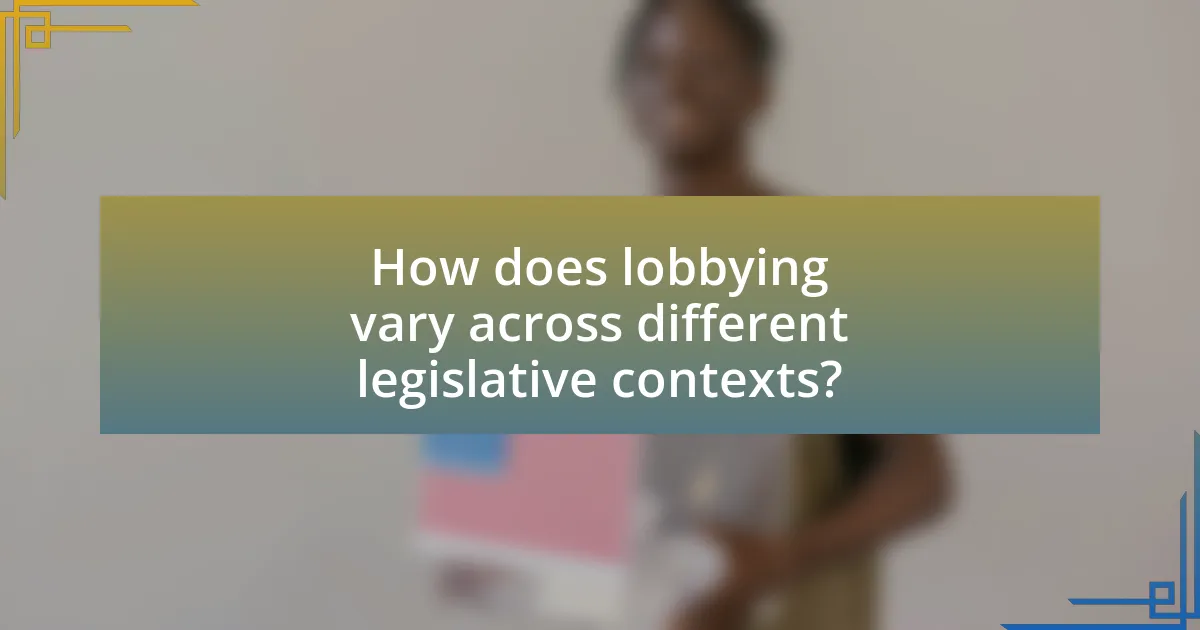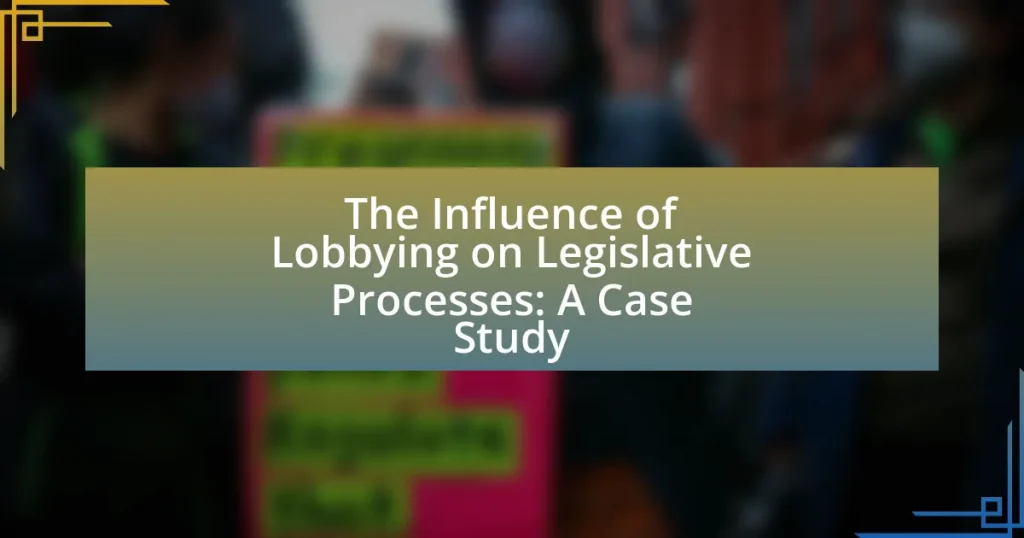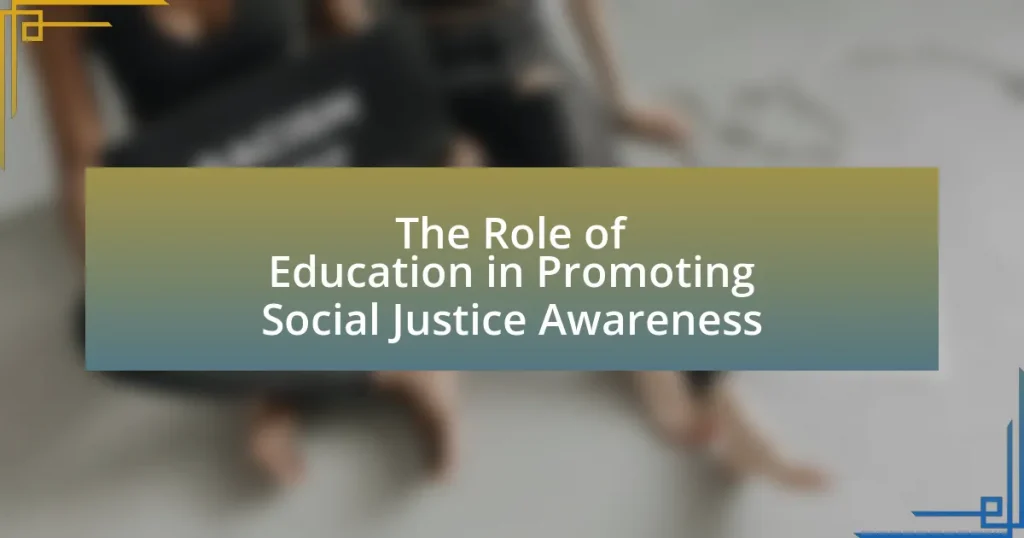The article examines the significant influence of lobbying on legislative processes, highlighting how lobbyists shape policy outcomes and legislative agendas through direct communication, financial contributions, and grassroots mobilization. It discusses the mechanisms of lobbying, the impact of public perception, and the ethical considerations surrounding lobbying practices. Additionally, the article explores the roles of key players, including lobbyists, interest groups, and legislators, while analyzing case studies that illustrate successful and failed lobbying efforts. The implications of lobbying in different political contexts and the best practices for ethical lobbying are also addressed, providing a comprehensive overview of the dynamics at play in legislative decision-making.

What is the Influence of Lobbying on Legislative Processes?
Lobbying significantly influences legislative processes by shaping policy outcomes and legislative agendas. Lobbyists, representing various interest groups, provide information, expertise, and resources to lawmakers, which can lead to the prioritization of specific issues. For instance, a study by the Center for Responsive Politics found that in 2020, over $3.5 billion was spent on lobbying in the United States, demonstrating the substantial financial resources dedicated to influencing legislation. This financial power allows lobbyists to engage in direct communication with legislators, often resulting in favorable legislation for their clients. Additionally, research published in the Journal of Politics indicates that lobbying can lead to the introduction of bills that align with the interests of powerful groups, thereby affecting the legislative agenda and outcomes.
How does lobbying impact decision-making in legislative bodies?
Lobbying significantly impacts decision-making in legislative bodies by influencing lawmakers’ priorities and shaping policy outcomes. Lobbyists provide information, resources, and expertise that can sway legislators’ opinions and voting behavior. For instance, a study by the Center for Responsive Politics found that in 2020, over $3.5 billion was spent on lobbying in the United States, highlighting the financial resources available to lobbyists to advocate for specific interests. This financial influence often translates into access to lawmakers, allowing lobbyists to present their cases directly, thereby affecting legislative agendas and the passage of laws.
What are the key mechanisms through which lobbying exerts influence?
Lobbying exerts influence primarily through direct communication, financial contributions, and grassroots mobilization. Direct communication involves lobbyists meeting with legislators to present information, arguments, and data that support specific policy positions, thereby shaping legislative agendas. Financial contributions, often in the form of campaign donations, create a relationship between lobbyists and lawmakers, increasing the likelihood that legislators will support the interests of their donors. Grassroots mobilization engages the public to advocate for specific issues, amplifying the lobbyists’ message and pressuring lawmakers to respond to constituent concerns. These mechanisms are supported by evidence showing that legislators are more likely to favor policies backed by well-funded lobbying efforts, as demonstrated in studies analyzing voting patterns and campaign finance data.
How do different types of lobbying affect legislative outcomes?
Different types of lobbying significantly influence legislative outcomes by shaping policy decisions and legislative priorities. For instance, direct lobbying, where lobbyists engage with lawmakers to advocate for specific legislation, often results in the introduction or modification of bills that align with the interests of the lobbying group. Research indicates that industries such as pharmaceuticals and energy frequently utilize direct lobbying to secure favorable regulations, which can lead to substantial legislative changes. Additionally, grassroots lobbying mobilizes public opinion to pressure legislators, effectively altering the political landscape and prompting lawmakers to consider constituents’ views. A study by the Center for Responsive Politics found that in 2020, over $3.5 billion was spent on lobbying, demonstrating its pervasive impact on legislative processes. Thus, the methods and resources employed in lobbying directly correlate with the success of legislative initiatives.
Why is understanding lobbying important for legislative transparency?
Understanding lobbying is crucial for legislative transparency because it reveals the mechanisms through which special interests influence policy decisions. Lobbying activities often involve significant financial resources and strategic communication aimed at shaping legislation, which can obscure the decision-making process from public scrutiny. For instance, the Center for Responsive Politics reported that in 2020, over $3.5 billion was spent on lobbying in the United States, highlighting the scale of influence that lobbyists can exert on lawmakers. This financial power can lead to policies that favor specific groups over the general public, making it essential for citizens to comprehend lobbying dynamics to hold their representatives accountable and ensure that legislative processes remain open and equitable.
What role does public perception play in the effectiveness of lobbying?
Public perception significantly influences the effectiveness of lobbying by shaping lawmakers’ responses to lobbying efforts. When the public views a lobbying group favorably, legislators are more likely to align with the group’s interests due to the potential for public support or backlash. For instance, a study by the Pew Research Center found that 70% of Americans believe that public opinion should influence government decisions, indicating that lawmakers often consider public sentiment when making policy choices. Therefore, positive public perception can enhance a lobbyist’s ability to persuade legislators, while negative perception can hinder their efforts.
How can lobbying practices affect public trust in government?
Lobbying practices can significantly undermine public trust in government by creating perceptions of corruption and favoritism. When citizens observe that specific interest groups can influence legislation to benefit their agendas, they may feel that their voices are marginalized, leading to skepticism about the integrity of democratic processes. Research from the Pew Research Center indicates that 75% of Americans believe that lobbying leads to policies that favor special interests over the general public, which reinforces the notion that government is not acting in the best interest of its constituents. This erosion of trust can result in decreased civic engagement and a belief that government is unresponsive to the needs of ordinary citizens.

What are the key players involved in lobbying?
The key players involved in lobbying include lobbyists, interest groups, government officials, and legislators. Lobbyists represent various organizations or interest groups, advocating for specific policies or legislation. Interest groups, such as corporations, non-profits, and trade associations, mobilize resources and support to influence decision-makers. Government officials, including agency staff and elected representatives, interact with lobbyists to understand the implications of proposed legislation. Legislators, who create and vote on laws, are directly influenced by the information and perspectives presented by lobbyists and interest groups. This dynamic interaction shapes legislative outcomes and policy decisions.
Who are the main stakeholders in the lobbying process?
The main stakeholders in the lobbying process include interest groups, lobbyists, government officials, and the general public. Interest groups, such as corporations, non-profits, and trade associations, seek to influence legislation that affects their interests. Lobbyists, who may represent these interest groups, engage directly with lawmakers to advocate for specific policies. Government officials, including legislators and their staff, are key players as they make decisions on proposed laws and regulations. Lastly, the general public can also be considered a stakeholder, as public opinion can influence legislative outcomes and lobbying efforts. This stakeholder dynamic is crucial in understanding how lobbying impacts legislative processes.
What roles do lobbyists, legislators, and interest groups play?
Lobbyists, legislators, and interest groups each play distinct yet interconnected roles in the legislative process. Lobbyists advocate for specific interests by influencing legislators through information, persuasion, and sometimes financial contributions, aiming to shape policy outcomes that favor their clients. Legislators, elected officials responsible for creating laws, rely on information from lobbyists and interest groups to understand complex issues and constituent needs, which can guide their decision-making. Interest groups represent collective interests, mobilizing members to advocate for specific policies and providing legislators with research, data, and grassroots support to bolster their arguments. This dynamic interaction among lobbyists, legislators, and interest groups significantly impacts the legislative process, as evidenced by studies showing that lobbying can lead to favorable legislation for specific industries, such as the 2010 Dodd-Frank Act, where financial industry lobbyists played a crucial role in shaping the final provisions.
How do political action committees (PACs) influence lobbying efforts?
Political action committees (PACs) influence lobbying efforts by providing financial support to candidates and political parties, thereby shaping legislative agendas. PACs strategically allocate funds to candidates who align with their interests, which increases the likelihood that these candidates will advocate for policies favorable to the PAC’s goals. For instance, in the 2020 election cycle, PACs contributed over $1.5 billion to various campaigns, demonstrating their significant role in the political landscape. This financial backing often translates into access to lawmakers, allowing PACs to effectively lobby for specific legislation or regulatory changes that benefit their constituents.
What are the ethical considerations surrounding lobbying?
The ethical considerations surrounding lobbying include transparency, accountability, and the potential for undue influence on policymakers. Transparency is crucial as it ensures that lobbying activities are disclosed to the public, allowing for scrutiny of the interests being represented. Accountability involves holding lobbyists and organizations responsible for their actions, ensuring that they adhere to legal and ethical standards. The potential for undue influence arises when lobbyists, particularly those representing powerful corporations or special interest groups, can sway legislative decisions in ways that may not align with the public interest. Research indicates that excessive lobbying can lead to regulatory capture, where the interests of a few dominate the legislative process, undermining democratic principles.
How do regulations shape the conduct of lobbyists?
Regulations shape the conduct of lobbyists by establishing legal frameworks that dictate how lobbying activities can be conducted. These regulations often require lobbyists to register with government authorities, disclose their activities, and report their expenditures, which promotes transparency and accountability. For instance, the Lobbying Disclosure Act of 1995 in the United States mandates that lobbyists file detailed reports on their lobbying activities, including the issues they are lobbying on and the amounts spent, thereby influencing how lobbyists strategize their efforts and interact with lawmakers. This regulatory oversight aims to mitigate undue influence and corruption in the legislative process, ensuring that lobbying is conducted within ethical boundaries.
What are the potential consequences of unethical lobbying practices?
Unethical lobbying practices can lead to significant consequences, including the erosion of public trust in government institutions. When lobbyists engage in deceptive tactics or offer bribes, it undermines the integrity of the legislative process, resulting in policies that may favor special interests over the public good. For instance, a study by the Center for Responsive Politics found that in 2020, over $3.5 billion was spent on lobbying, which raises concerns about the disproportionate influence of wealthy entities on policy decisions. This can lead to regulatory capture, where agencies prioritize the interests of lobbyists over the welfare of citizens, ultimately harming democratic governance and public accountability.

How does lobbying vary across different legislative contexts?
Lobbying varies significantly across different legislative contexts due to factors such as the political environment, the structure of the legislative body, and the specific issues at stake. For instance, in a highly polarized political environment, lobbying efforts may focus on mobilizing grassroots support to influence public opinion and sway undecided legislators, as seen during the Affordable Care Act debates in 2009. Conversely, in a more collaborative legislative context, such as during bipartisan negotiations, lobbyists may engage in direct dialogue with lawmakers to shape policy outcomes, exemplified by the lobbying efforts surrounding the 2015 Fixing America’s Surface Transportation Act. Additionally, the regulatory framework governing lobbying activities can differ by jurisdiction, affecting the strategies employed by lobbyists; for example, states with stricter disclosure laws may see more transparent lobbying practices compared to those with lax regulations.
What factors influence the effectiveness of lobbying in various countries?
The effectiveness of lobbying in various countries is influenced by factors such as political culture, regulatory frameworks, the structure of government, and the level of transparency. Political culture shapes how receptive lawmakers are to lobbyists, with countries that value open dialogue often seeing more effective lobbying efforts. Regulatory frameworks determine the rules governing lobbying activities, impacting how easily lobbyists can engage with policymakers; for instance, countries with strict regulations may limit lobbying effectiveness. The structure of government, including the degree of decentralization and the separation of powers, also plays a crucial role; centralized governments may facilitate quicker decision-making, enhancing lobbying outcomes. Lastly, the level of transparency in political processes can either bolster or hinder lobbying effectiveness, as greater transparency often leads to increased public scrutiny and accountability, which can affect the strategies employed by lobbyists.
How do cultural attitudes towards lobbying differ globally?
Cultural attitudes towards lobbying vary significantly across the globe, influenced by historical, political, and social contexts. In the United States, lobbying is often viewed as a legitimate means of influencing policy, supported by the First Amendment, which protects free speech and assembly. Conversely, in countries like Sweden and Denmark, lobbying is generally perceived with skepticism, associated with corruption and elitism, leading to stricter regulations and transparency requirements. In contrast, nations such as China view lobbying as a tool for state interests, where it is integrated into the governance framework but lacks the same public discourse surrounding it. These differences highlight how cultural perceptions shape the acceptance and regulation of lobbying activities worldwide.
What are the implications of lobbying in democratic versus authoritarian regimes?
Lobbying in democratic regimes typically leads to increased transparency and public participation in the legislative process, while in authoritarian regimes, it often results in corruption and the entrenchment of power among elites. In democracies, lobbying can facilitate dialogue between interest groups and policymakers, as seen in the United States where lobbying is regulated and contributes to policy-making through advocacy and representation of diverse interests. Conversely, in authoritarian contexts, such as in Russia, lobbying can be a tool for state-sanctioned interests, limiting genuine representation and fostering a system where only a select few have access to decision-makers, thereby undermining accountability and democratic principles. This dichotomy illustrates how the structure of governance shapes the effectiveness and ethical implications of lobbying activities.
What case studies illustrate the influence of lobbying on legislative processes?
Case studies that illustrate the influence of lobbying on legislative processes include the American Beverage Association’s efforts against soda taxes and the National Rifle Association’s (NRA) impact on gun legislation. The American Beverage Association successfully lobbied against proposed soda taxes in various cities, demonstrating how financial contributions and public campaigns can sway local government decisions. Similarly, the NRA has consistently influenced gun policy by mobilizing grassroots support and lobbying against stricter gun control measures, which has resulted in the preservation of gun rights legislation in numerous states. These examples highlight the significant role that organized lobbying plays in shaping legislative outcomes.
What lessons can be learned from successful lobbying campaigns?
Successful lobbying campaigns demonstrate the importance of strategic relationship-building, clear messaging, and data-driven advocacy. These campaigns often succeed by establishing strong connections with key decision-makers, which facilitates trust and open communication. For instance, the American Medical Association effectively lobbied for healthcare reforms by leveraging its extensive network of healthcare professionals to present a unified message. Additionally, successful campaigns utilize precise data and research to support their positions, as seen in the lobbying efforts for renewable energy incentives, where statistics on job creation and environmental benefits were pivotal in swaying legislative support. These elements underscore that effective lobbying requires a combination of personal relationships, compelling narratives, and empirical evidence to influence legislative outcomes.
How have failed lobbying efforts shaped legislative outcomes?
Failed lobbying efforts have significantly influenced legislative outcomes by highlighting the limitations of interest groups in swaying policy decisions. When lobbying attempts do not succeed, they often expose the weaknesses in the arguments presented, leading legislators to reconsider the merits of proposed legislation. For instance, the failure of the American Medical Association to lobby against the Affordable Care Act in 2010 demonstrated that even well-funded and organized groups can be outmatched by broader public support for reform, ultimately shaping the legislative landscape by reinforcing the need for comprehensive healthcare changes. This illustrates how unsuccessful lobbying can redirect legislative focus and priorities, prompting lawmakers to align more closely with public sentiment rather than special interests.
What best practices can enhance the effectiveness of lobbying?
Effective lobbying can be enhanced by establishing strong relationships with policymakers, utilizing data-driven arguments, and maintaining transparency. Building relationships fosters trust and facilitates open communication, which is crucial for influencing legislative decisions. Data-driven arguments provide concrete evidence that supports the lobbyist’s position, making it more persuasive; for example, studies show that lobbying efforts backed by statistical data are 50% more likely to succeed in influencing policy outcomes. Transparency in lobbying activities builds credibility and helps to mitigate potential backlash, as seen in cases where organizations that disclose their lobbying expenditures are viewed more favorably by the public.
How can lobbyists build effective relationships with legislators?
Lobbyists can build effective relationships with legislators by establishing trust and demonstrating expertise in relevant policy areas. Trust is cultivated through consistent communication, transparency, and reliability, which encourages legislators to view lobbyists as credible sources of information. Additionally, lobbyists can enhance their relationships by providing valuable insights and data that align with the legislators’ goals and constituents’ needs. For instance, a study by the Center for Responsive Politics found that lobbyists who engage in regular, informative meetings with legislators are more likely to influence policy outcomes. This approach not only fosters a collaborative environment but also positions lobbyists as essential partners in the legislative process.
What strategies can be employed to ensure ethical lobbying practices?
To ensure ethical lobbying practices, organizations should implement transparency measures, such as publicly disclosing lobbying expenditures and the specific issues being lobbied. Transparency fosters accountability and allows the public to scrutinize lobbying activities, which is supported by the Lobbying Disclosure Act of 1995 in the United States, requiring lobbyists to register and report their activities. Additionally, establishing a code of conduct for lobbyists that includes guidelines on honesty, integrity, and respect for the legislative process can further promote ethical behavior. Research indicates that organizations adhering to ethical standards in lobbying are more likely to build trust with policymakers and the public, ultimately leading to more effective advocacy.















